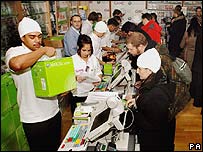
How was Christmas for you? If it was anything like mine, it was bloody expensive. At what point did Christmas become an enforced debt? I was amazed to learn from a family friend this week that some only finish paying off last Christmas in November, then take out a loan for the next one. Oh well, each to their own.
Credit cards have become, as far as I can tell, an extension of one’s finger. And it is the Internet shopping phenomenon of the last half decade that has helped drive this unrelenting virtual debt accumulator. Three days after Christmas, leading online retailer Amazon revealed record festive sales.
Take a second to digest the statistics. In the run up to Christmas weekend Amazon’s UK division delivered 480,000 gifts. On the busiest day a Royal Mail truck left one of its three distribution centres every 15 minutes. Globally, December 12 was busiest. Customers bought 3.6 million items, or, if you like, 41 items every second.
The news reminded me of a conversation I had with a colleague before Christmas, where we discussed the problems of shopping at this time. Busy streets (so busy indeed, that it is recommended that consumers attach indicator lights to their shoulders when in need of entering a shop), lengthy queues and SOLD OUT signs that stand smirking in place of the most desirable items.
I found myself arguing with my colleague that Christmas shopping, being the distasteful, stressful and downright soul destroying experience that it is, is in danger of becoming extinct. In a survival of the fittest kind of way, I argued, online shopping would rise from the primordial jelly that was physical retail therapy and abolish the high street for good.
But my colleague, fresh faced from a daring last minute lunch hour power shop, remarked that, for all the advances in Internet shopping over the last few years (including making it more simple, advances in educating a sceptical technologically afraid public that it is safe, and the proliferation in credit cards and the social acceptance of debt) the high street will never die.
Why? Because, despite the stress, people enjoy going out and shopping. They enjoy having a sales assistant make them feel important. They enjoy accumulating endless swathes of bags. They enjoy trying on clothes and discussing how big their bum looks with an apologetic friend. In short, they enjoy a day out shopping.
He has a point. I love Internet shopping. I bought a number of gifts online this Christmas and waited, gleefully, for them to arrive in the post. But the actual process of the purchase – logging on, registering, selecting a product and entering credit card details – is quite boring. Browsing is an exercise in website navigation, and, of course, there is no chance to try before you buy.
The conversation came to an end with some kind of compromise. The physical and the virtual would co-exist happily. Indeed, a blurring would emerge. What if Amazon opened a retail store on Oxford Street? It would include rows of designer computers that allowed customers to browse their website free of charge and place orders in a comfortable environment. Sales assistants would be on hand to offer guidance for those who are not as tech savvy as others, and food and drink would be available, perhaps in partnership with Starbucks, in the same way Borders does. Not only would this increase sales, but it would help convert the uninitiated in a shopping environment in which they already feel at home.
So, as other online retailers release record figures over the next few days, as I’m sure they will, traditionalists need fear not. The future promises a utopian shopping experience perfect for those who love the hustle and bustle of the high street, and those who enjoy the comfort of their own computer chair – and, perhaps, something for those who enjoy both.



